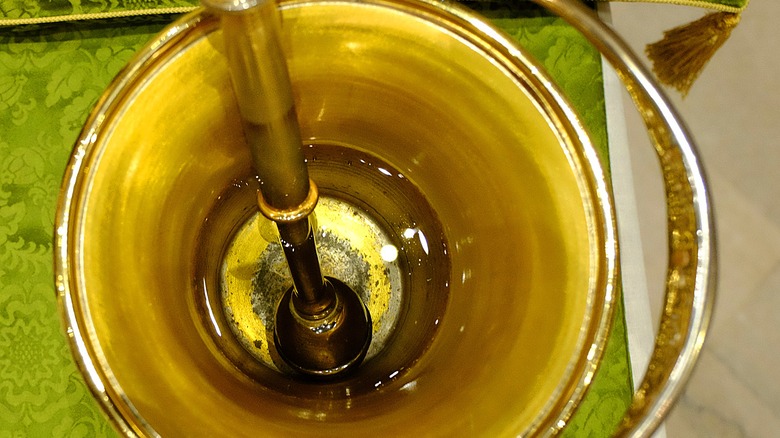Where The Phrase Kick The Bucket Might Have Originated
English has plenty of unique ways to say someone has died. Phrases like "bite the dust," "meet your maker," and "shuffle off this mortal coil" used to describe death may be a way to joke and remained lighthearted about the inevitability of dying, according to Mental Floss, but these idioms don't always make obvious sense. What dust are we biting? What mortal coil are we shuffling off?
"Kicking the bucket" is one such phrase whose meaning, for many people, remains opaque. This idiom is a casual, unemotional way to say that someone has died (via Writing Explained). According to the website The Idioms the first known recording of the phrase "kick the bucket" was printed in the "Dictionary of the Vulgar Tongue" in 1785. But despite its common usage, it's hard to describe exactly what the turn of phrase means. What bucket for example? And why does kicking that bucket lead to someone's death? In fact, there isn't a single, widely agreed-upon answer to these questions, but there are many different theories (via the Oxford University Press Blog).
Primary theories about the phrase's origins
One of the most widespread theories behind the phrase says that it describes the act of hanging oneself, according to Writing Explained. This theory posits that, in the past, when people hanged themselves or were hanged, they often stood on a pedestal or bucket to be tied up by the noose. When they were ready to die, they then kicked the bucket out from under themselves and were killed.
However, this theory hasn't necessarily been widely accepted, according to the Oxford University Press Blog. Alternate theories have been suggested, including a potential connection between the hanging of pigs for slaughter and the term "kicking the bucket," according to The Phrase Finder. This theory notes that the term "bucket" used to also refer to a beam that butchers used to string up pigs. These pigs were then slaughtered and butchered for meat. The phrase might refer to the way those pigs struggled while being killed, and, as they were struggling, kicked the beam, or "bucket."
Other theories about the idiom
However, the butcher theory has also received some resistance. For instance, some people have questioned how the term would have become so widespread, especially since there is no evidence that butchers used the term "kick the bucket" before it became a common idiom (via the Oxford University Press Blog).
Still, though there are other theories about the idiom, few have any real evidence to back them up. For instance, some have speculated that a cow's tendency to kick the bucket while being milked might have some connection to our idiom, though it's unclear how or why.
According to the website The Idioms, besides the theories that the expression could refer to suicide by hanging or situations arising during or after animal slaughter, it's also possible that the idiom could refer to the Catholic ritual of putting a pail of holy water at a deceased person's feet. The water was used by those who paid their respects so that they could bless the corpse with a sprinkling of the holy water.


